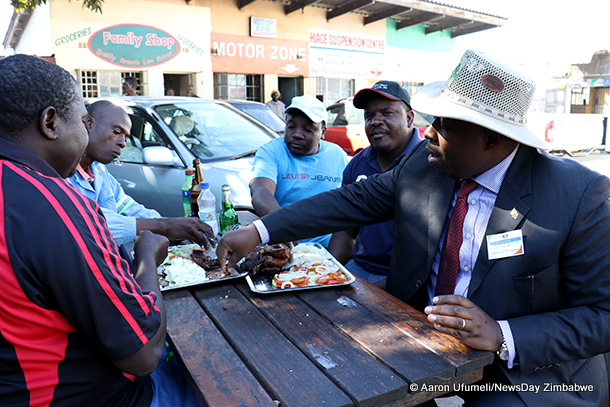
Saviour Kasukuwere is one of the few ministers in President Robert Mugabe’s Cabinet who still have some energy and tends to discharge his duties with a lot of exuberance.
This was true of his stints at Indigenisation and Youth minister as well as the Environment, Water and Climate portfolio to some extent.
He is one of the so-called young Turks that have become a permanent feature in Mugabe’s governments even if their delivery is quite questionable given that they are part of an administration dragging Zimbabwe deeper into a hellhole.
In Zanu PF they even call him Tyson because of his aggressive nature.
Kasukuwere is a sharp contrast to most of the old guard that has been with the President from time immemorial. His recent appointment to the Local Government, Public Works and National Housing portfolio to replace the meddlesome Ignatius Chombo, who moved to the Home Affairs ministry, was met with mixed feelings.
The ministry had in the past 15 years become a vital cog in Zanu PF’s scheme to retain state power at all costs. Kasukuwere’s critics feared he would take over from where Chombo left given that he is also Zanu PF national political commissar.
Chombo became unpopular for his partisan approach to local governance issues, a stance that contributed to the multiple problems facing Harare and Chitungwiza municipalities today.
The minister, who was shunted to Home Affairs in the latest Cabinet reshuffle, did all in his power to distabilise the opposition run municipalities and at some point replaced elected councilors with handpicked Zanu PF apologists.
- Chamisa under fire over US$120K donation
- Mavhunga puts DeMbare into Chibuku quarterfinals
- Pension funds bet on Cabora Bassa oilfields
- Councils defy govt fire tender directive
Keep Reading
Chombo promoted a culture of parallel structures that are largely responsible for the illegal allocation of land in Chitungwiza and Harare, which is now giving city fathers headaches.
The disruption of local authorities was done for political expediency as Zanu PF was too desperate to regain control of councils that were run by the Morgan Tsvangirai-led opposition MDC.
Therefore, there were fears Kasukuwere would go the same route if he has to succeed in his role as Zanu PF commissar and judging from his recent statements these fears could be justified.
According to a report we carried yesterday, the minister has accused MDC-T-run local authorities of corruption and threatened to keep them under surveillance.
He told mayors, town clerks and secretaries he had summoned to Harare last week that “the honeymoon was over”.
Kasukuwere said he would have watchdogs in communities to safeguard against incompetence and corruption by councillors and council officials. The minister might have good intentions but he is already starting from a wrong premise.
A month is not enough to come up with such a blanket assessment of local authorities given that he has only done consultations with the Harare City Council since his appointment.
An effective minister would take time to listen to problems facing these councils before prescribing solutions.
Plunging into the ministry with an “I know-it-all” approach could prove catastrophic for local authorities.
After a 15 year-long turbulence, the Local Government ministry needs a sober mind and less confrontation. It is not only urban and rural district councils that suffered under Chombo’s stewardship, traditional leadership institutions were ruined.
The country’s courts are clogged with chieftainship disputes blamed on the Local Government ministry’s dictatorial tendencies and politicisation of issues. Kasukuwere needs to take time to understand these many challenges facing local government institutions before dealing with them in a non-partisan manner.
The country has adequate institutions to act as watchdogs for local authorities such as residents associations, civic groups and law enforcement agents and there is no need to add vigilante groups to that matrix.











